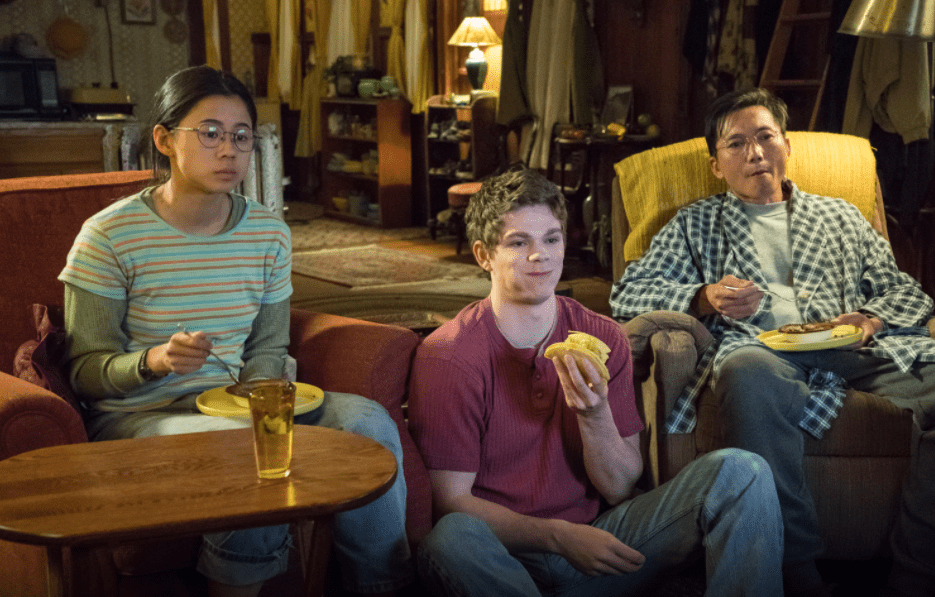
It’s been 16 years since the release of writer-director Alice Wu’s Saving Face, but her sophomore feature, The Half of It, is only hitting Netflix today. Just as that film (a semi-autobiographical account of Wu’s struggle to reconcile coming out with her Chinese-American identity) broke ground in terms of its representation, her latest is poised to do the same for a much younger generation.
The Half of It follows Ellie (Leah Lewis), a first-generation Chinese-American teenager living in the small, backwards fictional town of Squahamish. A deeply-closeted loner whose social life consists of writing other students’ papers while watching old movies with her dad (Collin Chou), her routine is broken when lunkhead football player, Paul (Daniel Diemer), enlists her help writing love letters to the pastor’s daughter, Aster (Alexxis Lemire). Ellie reluctantly becomes Paul’s Cryano de Bergerac, but as she writes both letters and texts to Aster, she fails to mention that Aster also happens to be her secret crush. It’s a set up ripe for typical rom-com shenanigans, but The Half of It is instead a smart and unpredictable film that deftly explores complex ideas while also delivering compelling romance.
That said, when it starts, the film can lean too much on cliché. Like so many fictional teenagers before them (including Elle Fanning and Justice Smith in Netflix romantic drama, All the Bright Places, from earlier this year), the kids here can feel a little too worldly. It’s already a bit of a stretch when Aster picks up Ellie’s dropped copy of The Remains of the Day and remarks how she loves the book’s repressed longing, but it stretches believability when she later recognizes a quote from Wim Wenders’s Wings of Desire Ellie uses in a love letter.
Granted, Wu is using those references to indicate to the audience the kind of love story she’s telling, but there are unfortunately other inconsistencies. For instance, while the film makes comedic hay out of Paul not having access to the messaging app Ellie uses to write to Aster under his name, it’s also a little hard to believe in this day and age these kids wouldn’t find a bette solution. Still, while those slips in believability initially grate, they’re eventually outweighed by Wu’s fidelity to both her characters and the world she establishes for them.
Though Paul’s debilitating awkwardness around Aster or the way her fiercely conservative parents want her to marry her jester of a boyfriend the moment they graduate feel believable, it’s perhaps the way the film deal’s Ellie’s race that’s most impressive. There’s the racism she faces, like the way a group of white students casually make fun of her last name, Chu, every time they drive past her. The repetition and the Ellie’s lack of reaction suggest they’ve been doing it for years and subtly explain why Ellie is both so removed from her peers and desperate to leave.
Even more impressive and more difficult to pull off, however, is the way her ethnicity feels both integral to the character and unobtrusively a fact of her life. Moments where she and her father silently cook together or the way Ellie easily slips between English and Mandarin make her experience feel lived-in and real and it’s precisely because the film gets important and particularly small character traits like this so right that it’s narrative stakes eventually works so well.
While Paul and Ellie struggle to define love throughout The Half of It, the element they keep missing–and the element that ultimately complicates the love triangle–is intimacy. As Ellie and Aster text each other late into the night, they build an emotional and intellectual bond that Paul’s bumbling sweetness in the real-life dates can never match. Likewise, the time Paul spends learning to cook with Ellie’s father or getting to know her is ultimately more meaningful than any dreams he projects onto Aster. Indeed, despite its complex conceit and relationship dynamics, the simplest gestures in Wu’s film are perhaps its most striking.
Though Ellie and Aster share little actual screen time, they do share one key scene together. In it, Aster takes Ellie to her favorite place: a natural thermal pool in a secluded spot. It begins with the typical teen movie awkward longing as Ellie is suddenly in close proximity (and a state of undress) with Aster, but it soon shifts into something more lyrical. As the girls float on top of the water, staring at the sky, Chicago’s “If You Leave Me Now” comes on the radio. As one of her mother’s favorites, Ellie recalls her once saying that every song, movie or story has a best part. As the song crescendos, Aster asks if that was it and while the characters are certainly talking about the song and they’re moment of intimacy, it’s Wu’s signal that this is the film’s romantic apex. And while that’s a bold statement, it’s also inescapably, beautifully true.
In that moment and throughout, it’s the truth driving The Half of It that makes it so remarkable. Things certainly grow more complicated in the film’s final act and though that inevitably leads to the usual grand romantic gestures and dramatic reveals, every turn is also grounded in the film’s fidelity to its characters as real people. Wu’s script grapples with race, gender, sexuality, even family obligation with such gentle honesty that the small notes that ring false just don’t matter in the long run. This may be Wu’s sophomore feature, but it feels like the work of a seasoned veteran. Hopefully she won’t make us wait so long for her next feature.

